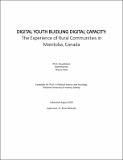| dc.contributor.advisor | McGrath, Brian | |
| dc.contributor.author | Kelly, Wayne | |
| dc.date.accessioned | 2021-01-14T14:37:35Z | |
| dc.date.available | 2021-01-14T14:37:35Z | |
| dc.date.issued | 2020-08-31 | |
| dc.identifier.uri | http://hdl.handle.net/10379/16454 | |
| dc.description.abstract | Today's digital society creates new realities and opportunities for rural communities. To fully take advantage of those digital opportunities, rural communities must build the capacity and culture to utilize digital technologies. People under 30 years old have grown up in a digital world, being born along with the Internet. In that context, youth may represent a unique opportunity for rural communities to embrace digital technologies and realize more of the benefits and prospects of a digital, 21st-century world. This Ph.D. research explores youth digital capital, describing the current use, barriers, and opportunities of youth and digital technologies in rural Manitoba communities. A digital lens is applied to the community capitals framework to examine rural digital readiness, opportunities and barriers in rural Manitoba. The concept of the digital divide and digital technology adoption provide additional context for the digital community capital lens. Concepts and ideas from anthropology, education, and library studies guide the exploration of building digital capacity for youth in rural communities. The methodology used for this study incorporates mixed data collection tools over two phases of data collection. The first data set sets the stage utilizing five youth focus groups, and ten key informant interviews examine the digital capacity of rural youth and communities in Manitoba. The second phase used community-based research to explore digital skill building for youth in rural Manitoba. Participant observation and participant interviews document 16-months of my role as the coding club mentor for the Westman Regional Libraries' CoderDojos. In this research, I helped lead the creation of three coding clubs for 53 youth aged 7-14 across three different communities in western Manitoba. Thematic analysis explores findings from both data sets against the community capitals framework and the core concepts related to digital youth and rural communities. The findings illustrate that rural Manitoba is struggling with digital divides in infrastructure and capacity and the presence of digital deserts, areas without digital training or use opportunities. The research also demonstrated that targeted initiatives with local support can affect digital change in rural communities, building the digital capacity and a culture of exploration amongst local youth. | en_IE |
| dc.publisher | NUI Galway | |
| dc.rights | Attribution-NonCommercial-NoDerivs 3.0 Ireland | |
| dc.rights.uri | https://creativecommons.org/licenses/by-nc-nd/3.0/ie/ | |
| dc.subject | digital | en_IE |
| dc.subject | youth | en_IE |
| dc.subject | rural | en_IE |
| dc.subject | community capitals | en_IE |
| dc.subject | digital capital | en_IE |
| dc.subject | coding club | en_IE |
| dc.subject | Arts, Social Sciences and Celtic Studies | en_IE |
| dc.subject | Political Science and Sociology | en_IE |
| dc.title | Digital youth building digital capacity: The experience of rural communities in Manitoba, Canada | en_IE |
| dc.type | Thesis | en |
| dc.local.note | The first part of this Ph.D. research looks at how youth are using digital technologies in rural areas, finding that youth need more digital opportunities in rural Manitoba. Building on those findings, this Ph.D. also worked with three libraries to start coding clubs for youth between 7-14 years old, showing that it is possible and effective to created digital change in rural communities. | en_IE |
| dc.local.final | Yes | en_IE |
| nui.item.downloads | 1011 | |


